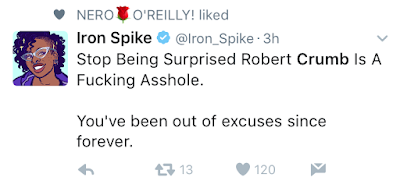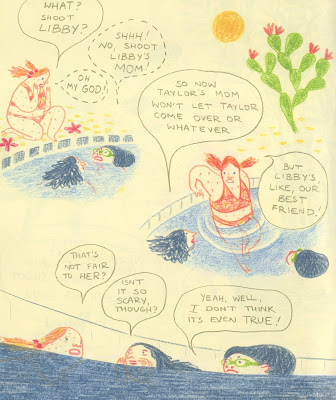The worst example I'm aware of dates back to 1991 (republished in 2014). In the introduction, Gary Groth describes an image of the artist where Crumb is "tweaking his critics" by depicting himself "standing atop a (presumably dead) naked woman's buttocks, chortling, 'Fuck 'em and cut their heads off!'" This is of course the sort of edgelord garbage for which Crumb is celebrated, but Groth wants us to know that looks can be deceiving. "No raving pervert, Crumb is soft-spoken, articulate, thoughtful and--above all, honest, both about his work and his own sex life."
Really, Gary? Because that's not what I'm getting from this clip:
To recap, Crumb did...something...to a woman that made her scream and flee his home. Most humans at that point would realize they had done something wrong and experience guilt, shame, or alarm. Not Crumb! He just felt like a loser because he didn't get laid. "Oh, well."
He interpreted a woman screaming and running away from him as sexual rejection. Is that what you see?
You'll notice something else about that exchange, which is that Groth himself has watched Crumb "jump on women" (plural, meaning multiple times). Does that qualify as making a pass at someone, or were those assaults, too? Who knows, but Groth describes himself as "astonished," and whatever went down was weird enough that he wondered if Crumb had ever been punched for it.
Cool interview.
Fast-forward to 2017, when Crumb was interviewed about famous people in history for some reason. (The premise of caring about what Crumb thinks about Napoleon is hilarious to me, but to each their own.) Here's what Crumb had to say when he was asked about Donald Trump:
The assaults that Crumb describes committing here aren't as specific as what he described in the exchange that he had with Groth, but I think the implications are plain.
It is within this context that Crumb's art exists.
And it is up to each of us to decide to what degree we should separate the art from the artist.
The comic above was celebrated by the AV Club in 2008, #1 on a list of comics it describes in the headline as "confessional" and "unflattering." (Julie Doucet picking her nose was #5.) Per the write-up, "In the 1988 story 'Memories Are Made of This,' Crumb recalls an evening in 1976 when he worked overtime to soften up a woman who was his exact physical ideal...and finally succeeded when she drank enough wine to be practically incoherent." This looks and sounds like rape to me, but the AV Club seemed to find it pretty hot: "Then he had his way with her, sticking his hand in her mouth, pressing her head to the ground, and mounting her from behind like a cowboy on a bronco." Yeahhhhhh doggie! Rape that drunken bitch like you mean it.
The headline also describes the comic as "autobiography," though as someone who doesn't read Crumb I don't know enough about its context to say that was strictly how these panels were presented. I do know that if you talk to almost any autobiographical cartoonist (maybe any cartoonist full stop) over 45--even progressive ones like Joe Sacco and Alison Bechdel--you will find that Crumb is universally beloved, with the notable exception of Trina Robbins. Because Trina Robbins is fucking rad.
Allegorical interlude
And then we have the Comics Journal. Just a week or so ago, here's how Tim Hodler linked to the interview from which that long pussy-grabbing excerpt was taken:
You'll note the way in which Hodler's excerpt frames Crumb as the counterculture hero that so many people wish he was. (Comics men just love talking about how Crumb has been taking down Trump since 1989.) How did Hodler read that interview and choose that quote, while completely ignoring the much more newsworthy fact that Crumb found common ground with Trump over the one thing during the campaign that was so egregiously awful that even the most reprehensible Republicans denounced it? Well, probably the same way that people read the "house negro" piece back in 2015 and chose to circulate this quote:
Bitch he lives in a villa in France. But bomb the banks! Sure! He sure is sticking it to the man from his fucking castle. Never mind that a single cover drawn by your anti-capitalist hero recently fetched more than $100,000 at auction.
I have beef with people on my "side" too. Someone read my roundup the other day and tried to start a conversation about how Crumb is gross...
...which is great. But then the people who weren't shocked and/or disgusted just seemed exasperated that this was coming up again and were really condescending about it.
I find the psssh that's old news take really fucking irritating because there's a good reason that this is news to people, and that's because Crumb is routinely whitewashed into a "politically incorrect artist" by comics movers and shakers. I'm not convinced that the term politically incorrect even begins to capture the frequency and degree of racism in his work, but that's a whole other ball of wax.
Crumb's "ironic" racism
I might be wrong about this, but I think a lot of people outside comics find images like the above shocking because this is the type of imagery that most people associate with Crumb:
But I'm getting off topic. To return to my point: Yet another thing preventing Crumb's sexual predation from entering the record is when people conflate his whole thing with the more general strain of misogyny in the work of other autobiographical cartoonists from around the same period.
Please don't do that shit. It's insulting to all those other misogynistic piece of shit cartoonists, because most of the time there really is a distinction to be made between IRL assault and fashioning a career out of drawing yourself jacking off.
The interviews I've quoted are possibly the tip of the iceberg; Crumb is old and has been interviewed many times over the years, and I've skimmed maybe six of them. There's potentially other stuff that I'm not aware of. On top of that I would argue that comments that may have read as more or less innocuous in the past come across differently once you understand that Crumb's notion of sexual assault is limited to rape and attempted rape. Here's him talking in 2013:
Any apartment where two or three girls were living together was constantly being invaded by young males on the prowl, including me. With little or no courtly preliminaries I would impudently assault any young, luscious girl flesh that happened to be in the room. Sometimes they would just as casually push me off, sometimes not. It was “hip” at the time to be sexually permissive, but if they spurned my advances I would back off. I was a “sensitive” male. I was not a rough hard-ass. I gave off no vibes of menace. I never forced myself on them or committed what’s now called “date rape.” I was “playful.” I liked to horse around. I liked big, strong girls and would climb all over them, push them down and go for a ride on their butt, stuff like that. It’s amazing now to remember how often the young girls I knew put up with my shenanigans. Maybe they liked it, I don’t know.Granted, this is an exercise in interpretation--unlike his other discussions of assault, which are unambiguous--but can you really trust his framing here? Certainly the phrase "little or no courtly preliminaries" gives me pause. Recall Gary Groth's comments from that 1991 interview. Recall that in the 2017 interview Crumb described anything that's not rape as "people's sex life." Even with rape, we're talking about whatever he considers rape--which doesn't seem to include, say, fingering a girl who's in a "drunken stupor" apropos of nothing, without giving her any indication of what he was about to do. Note that you can only make that last leap if you read the comic from earlier in this post as something that literally happened. Is that fair? Crumb has other unsettling sexual comics that seem to be pure fantasy, so does it make sense to take a more banal one that's about date rape literally? I don't know, but someone who can take a long hard look at that comic without wanting to puke should probably give that some serious thought.
Consider this: Even the likes of Eddie Berganza don't have the balls to publicly discuss the assaults they've committed. Even within the toxic milieu of corporate comics, that isn't permissible because even those empty fucking goblins have at least some vague notion that sexual assault and date rape are bad. I guess this is the "honesty" for which Crumb is so loved: being ignorant enough to assault women throughout his life without even realizing it, and existing within an environment that idolizes him for it. In comics today, there's a Crumb Divide that can be broadly (if imperfectly) broken down into the older people who revere him and the younger people who find him repulsive and increasingly irrelevant. Crumb's defenders--and make no mistake, cultural gatekeepers like Groth have spent decades defending this guy, painting anyone who doesn't lap up his bullshit as an ignorant rightwing prude--would prefer to frame the central conflict as being purely about Crumb's controversial art. But that is only one piece of what becomes a very unsettling picture of a serial abuser and the underground comics scene that enabled him that emerges from even the most cursory examination of words that Crumb himself has said in interviews.
Such interviews are more or less consigned to obscurity, and people like Groth, for all their empty declarations about how much they value "honesty" in comics, will gladly whitewash Crumb's reputation until the day he dies, and probably long after that. The mythology of art comics relies heavily on these counterculture heroes who unwittingly perpetuate the status quo and celebrate themselves for it. Surely it's possible to acknowledge their failures without denying their contributions. Surely that would be the "honest" and "brave" thing to do, to use a few terms those people profess to understand.
I could care less whether or not people like Crumb's art. I'd like the record to show that he is a sexual predator, but I don't have high hopes for it. Apart from huge obstacles like misogyny and hero worship, I think it's hard for people to perceive someone who looks like that as being capable of sexual assault--and that includes Crumb himself. It seems like the least that comics historians could do is acknowledge the stuff that he's on the record talking about, which seems germane to his work, particularly his comics that depict sexual violence. Sadly, I don't have high hopes for that, either. So how about the rest of us stop pretending that Crumb being gross is old news. It has never been news at all, and that's symptomatic of a much larger problem.







































